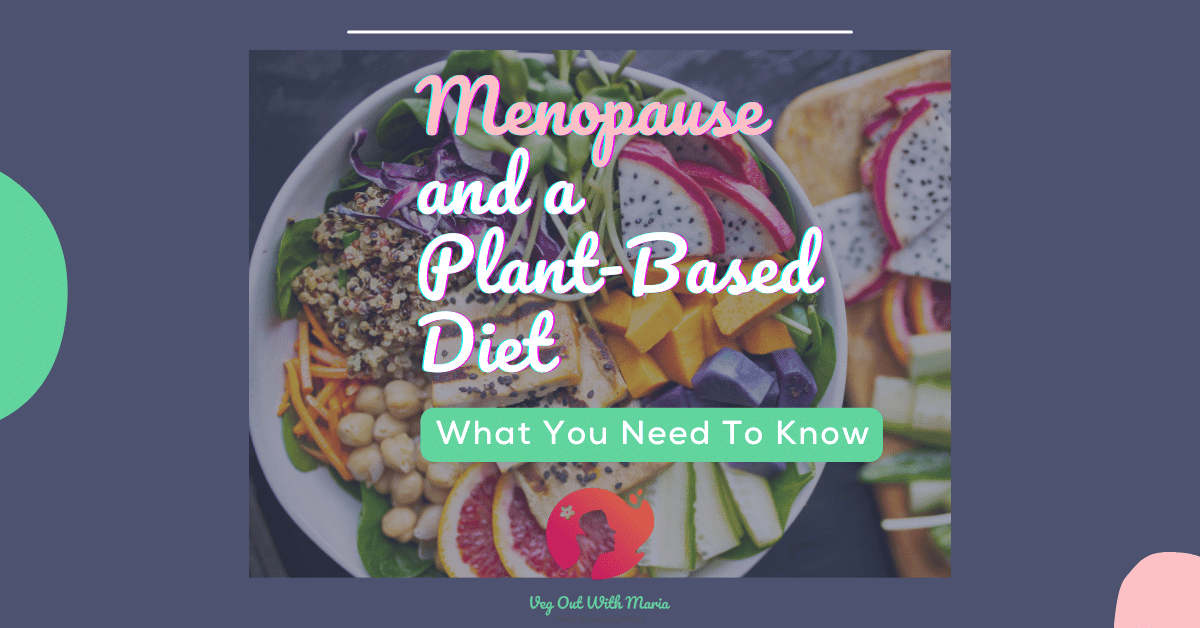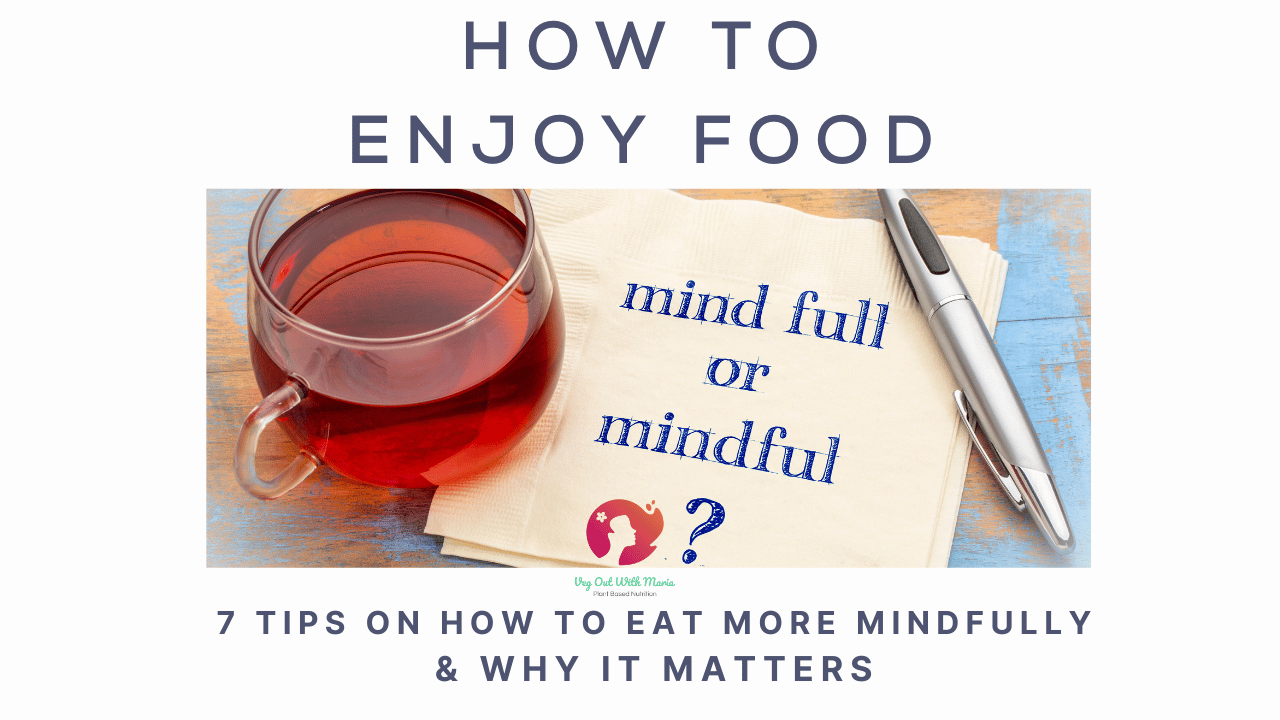Updated 7/24/25
You may think enjoying your food is a no-brainer. You eat what you like, and it tastes good. What more to eating is there? Many of us typically eat without paying much attention to what is on our plate, let alone how we eat it.
Others may be so used to restricting their diet for health or weight reasons that all the focus on what they can’t eat can take a lot of the pleasure out of eating.
Mindful eating can be beneficial during menopause and also encourages a healthier relationship with food, allowing for a more intuitive, less stressful approach to eating.
In our fast-paced world, it is easy to eat distractedly and without truly taking the time to enjoy our food and how it makes us feel.
This blog post covers 7 tips on how to enjoy your food while eating more mindfully and why it matters during menopause.
7 Advantages Of Mindful Eating During Menopause
Mindful eating during menopause offers several powerful benefits that support both physical and emotional well-being during this transitional phase. Here are some key advantages:
1. Supports Weight Management
Hormonal changes during menopause can lead to weight gain, especially around the midsection. Mindful eating helps you tune in to hunger and fullness cues, reducing overeating and emotional snacking.
2. Reduces Stress Eating & Emotional Cravings
Fluctuating estrogen levels can trigger mood swings, anxiety, and cravings. Mindfulness encourages awareness of emotional triggers, helping to break the cycle of stress eating.
3. Improves Digestion & Absorption
Eating slowly and with attention can enhance digestion by activating the parasympathetic nervous system (“rest and digest”). Slowing down and chewing food more can also improve digestion and nutrient absorption, ensuring your body gets the most out of food.
4. Enhances Hormonal Balance
By reducing stress (which impacts cortisol levels), mindful eating indirectly supports more balanced hormones, which may ease symptoms like hot flashes, irritability, and sleep disturbances.
5. Encourages Healthier Food Choices
When you’re fully present at meals, you’re more likely to choose nutrient-dense foods that support menopause, like fiber-rich veggies, calcium-packed greens, and plant-based proteins.
6. May Improve Sleep Quality
Avoiding late-night or unconscious snacking, especially on sugary foods, can help stabilize blood sugar and promote more restful sleep.
7. Cultivates a Positive Relationship with Food & Body
Mindful eating fosters self-compassion and body awareness, which is important during a time when many of us feel disconnected from our changing bodies.
7 Tips On How To Eat More Mindfully

Are you ready to try incorporating more mindful eating? The following tips should help you get started!
1. Slow Down
I know I am often guilty of eating too quickly, but just taking the time to slow down and really chew your food has so many benefits.
Chewing your food more instead of inhaling it can help you have better digestion. Digestion starts in the mouth with the release of enzymes in your saliva.
Amylase is released to help break down complex carbohydrates like starches into sugars and lingual lipase starts working on breaking down fats in your mouth. So, taking the time to chew more to release these enzymes leaves less work for the stomach and fewer potential digestive issues.
When you take the time to chew more this also makes you eat slower. This can give your brain a chance to receive signals from your gut which let you know that you are full.
Oftentimes, we miss these signals because we are eating too fast. It usually takes around 20 minutes for our brain to recognize that we are full. By slowing down we allow enough time to receive these signals which helps us to avoid over-eating1
Some tips to help you slow down:
Set your fork down between bites – or at least when you recognize that you are eating too fast. This gives you a chance to remind yourself to slow down, chew, and appreciate all the flavors and taste before swallowing and shoveling in another bite.
Breathe! Just taking a few deep breaths before and after our meals can help us slow our nervous system down and promote better digestion.
I don’t know about you, but using chopsticks helps me slow down. I am definitely less efficient with chopsticks which makes me slow down and work more for each bite.
2. Create A Healthy Eating Environment
You wouldn’t think where you eat would have much impact on what and how much you eat but it does.
If you eat while watching TV, looking at your smartphone, laptop or while driving in your car odds are you are eating more mindlessly.
Eating while distracted by electronics or other activities often makes you not only overeat but also enjoy your food less.
Sitting down at a table and setting aside around 20 minutes for your meal without distraction is ideal. Of course, we don’t always have the time to do this.
If you can set aside the time just one meal out of the day or even one meal out of the week to do this, try it! Notice the differences when you eat this way.
Another tip for creating a healthy eating environment is surrounding yourself with food options that help support your health goals.
If one of your goals is to eat more whole plant foods and fewer ultra-processed foods, then start setting up your kitchen and pantry with healthier choices to support this goal. This will help set you up for success.
3. Tune In To Your Hunger Cues
Eating more mindfully helps you tap back into your hunger and fullness cues.
It’s important to know that hunger can come in different forms other than the usual “stomach hunger”. Shakiness, headache, irritability, low energy, poor concentration can all be signs that you may need to fuel your body.
Sometimes your hunger can be triggered by your emotions (stress, anxiety, depression, loneliness, etc.) or just the sight or smell of food can trigger hunger.
Becoming more aware of where your hunger is coming from will better help you identify what you really need.
There’s a tool called “The Hunger Scale” which you can use to help you identify and gauge your hunger until it becomes more second nature.

Check in with yourself before you eat a meal or snack to see where you fall on the hunger scale. Ideally, your cues to eat should surface at around a 3 or a 4.
When it comes to knowing when to finish your meal, try eating until you are close to full, around a 6 and give yourself 10 minutes to re-evaluate your hunger. Oftentimes you will find with enough time to listen to your internal signals, you will realize that you now feel satisfied and are more a 7.
If you are still hungry then eat a little more. If you find yourself eating beyond fullness it may mean that you didn’t eat enough earlier in the day.
Using this tool can help you rediscover how your body responds to hunger and what kind of hunger you are really feeling so that you can be more in-tuned with your natural cues and give your body what it needs.
4. Using All Your Senses

You are probably used to using your sense of taste to enjoy all of the different flavors and textures of your meal but what about your other 4 senses?
Let’s take your sight for instance. Slow down to appreciate the display, all the different colors, shapes and ingredients used to make your meal.
What about smell? I love the smell of a freshly baked apple pie. Sitting inhaling the aroma of the cinnamon, brown sugar, vanilla with sweet juicy apples gets my mouth salivating! Just take the time to appreciate the smell of your food before you taste.
Notice the feel and weight of the utensil you’re holding, the transfer of heat from your food, how the bread feels as you hold your sandwich, and all the different sounds that come from and during your meal.
It may seem silly, but all of these things help you slow down and appreciate all the minute details that we tend to overlook.
5. Plan Ahead
Incorporating some meal planning into your week can actually encourage you to eat more mindfully.
I’m not talking about strict or rigid calorie controlled meal plans, but planning out what you feel like eating for the majority of the week with some room for flexibility.
By planning ahead, you are better able to plan more balanced and nutritious meals and avoid eating hastily or grabbing for convenience.
Meal planning can also help free up some time during the busy work week when you really need it because you are more prepared. All of this can encourage you to more mindfully chose your meals.
6. Eating For Nourishment & Pleasure
Along the same lines, when you eat more mindfully you have more awareness of how your body feels and the kinds of foods that make you feel good.
Eating becomes an opportunity to nourish your body and provide you with the energy you need to fuel your activities for the day. You should also look forward to your meal!
Explore using different herbs and spices to add flavor to your food. We are inundated with sugar, fat, and salt in ultra processed foods. Sometimes it takes a while to adjust our tastebuds to appreciate the subtle flavors of real food.
7. Share Mealtimes With Others

Many of us are used to eating most of our meals alone. However, eating with others and sharing cultural traditions through food has long been a part of our history.
Sharing mealtime with others has actually been shown to help improve your mental and physical well-being. According to a recent American Heart Association survey of 1,000 adults, they found that 91% of parents share that their family experiences less stress when they share family meals together.1
Besides helping to reduce stress, making the time to connect with others and to slow down were also noted as some of the primary benefits of mealtime.
This is a great expansion of your mindful eating practice with the added benefit of increasing your social connection and, in turn, improving your mental and physical well-being.
Find more opportunities to eat with your family, co-workers, and friends. Focus on slowing down, enjoying your food and being together with gratitude.
How To Enjoy Food ~ The Mindful Way
Mindful eating offers meaningful health benefits during menopause, helping to cultivate a more positive and balanced relationship with food. By tuning in to your body’s natural hunger and fullness cues, you can better support your nutritional needs while avoiding overeating or emotional snacking.
Slowing down at meals, chewing thoroughly, and paying attention to how food makes you feel can enhance digestion and nutrient absorption. Planning meals with intention often leads to healthier choices that align with your wellness goals.
Eating mindfully also heightens your sense of satisfaction and enjoyment with each bite. And when you share meals with others, you strengthen social bonds, reduce stress, and boost both mental and physical well-being, making mealtime a nourishing experience in every way.
So, make eating a more mindful and enjoyable experience. Every meal is an opportunity to practice mindfulness. Incorporate some of these techniques into your eating routine and notice how it enhances your ability to enjoy your food.
Other Articles To Explore…




